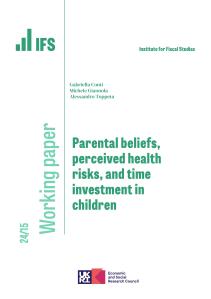Access
We estimate production functions for cognition and health for children aged 1–12 in India, based on the Young Lives Survey. India has over 70 million children aged 0–5 who are at risk of developmental deficits. The inputs into the production functions include parental background, prior child cognition and health, and child investments, which are taken as endogenous. Estimation is based on a nonlinear factor model, based on multiple measurements for both inputs and child outcomes. Our results show an important effect of early health on child cognitive development, which then becomes persistent. Parental investments affect cognitive development at all ages, but more so for younger children. Investments also have an impact on health at early ages only.
Authors

CPP Co-Director
Orazio is an International Research Fellow at the IFS, a Professor at Yale and a Research Associate at the National Bureau of Economic Research.

Research Fellow Yale University
Costas is a Research Fellow of the IFS and a Professor of Economics at Yale University and a Visiting Professor at University College London.

Emily Nix
Journal article details
- DOI
- 10.1093/restud/rdaa026
- Publisher
- Oxford University Press
- Issue
- Volume 87, Issue 6, November 2020
Suggested citation
O, Attanasio and C, Meghir and E, Nix. (2020). 'Human capital development and parental investment in India' 87(6/2020)
More from IFS
Understand this issue

Conservative Party Conference: Can the next government afford the NHS?

Sure Start achieved its aims, then we threw it away
15 April 2024

Retirement is not always a choice that workers can afford to make
6 November 2023
Policy analysis

Recent trends in and the outlook for health-related benefits
19 April 2024

4.2 million working-age people now claiming health-related benefits, could rise by 30% by the end of the decade
19 April 2024

The short- and medium-term impacts of Sure Start on educational outcomes
9 April 2024
Academic research

Parental beliefs, perceived health risks, and time investment in children
15 April 2024

The consequences of miscarriage on parental investments
22 March 2024

The menopause "penalty"
18 March 2024